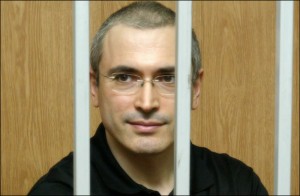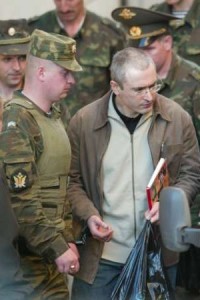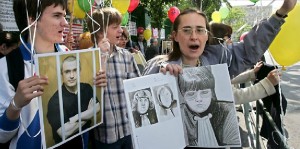First Trial (2004-2005)
 In a predawn raid on October 25, 2003, armed commandos stormed a Yukos chartered plane refuelling on the tarmac of a Siberian airport. Mikhail Khodorkovsky was arrested at gunpoint. He was ostensibly being arrested to appear as a witness in an investigation underway in Moscow, but within hours after being delivered to the authorities there who sought to question him, Khodorkovsky was charged with fraud and tax evasion and he has been in detention ever since. Khodorkovsky’s arrest came almost four months after his business partner Platon Lebedev was arrested. The first trial of Khodorkovsky and Lebedev began in June 2004 and concluded in May 2005. The defendants were subjected to grave injustices in the interpretation and application of Russian law, while the authorities concurrently pursued an attack on Yukos through the pretext of reassessments of the company’s tax payments. Moscow’s Meshchansky Court found both men guilty of almost every charge, sentencing them to nine years in prison, a sentence subsequently reduced by the Moscow City Court to eight years during a mostly unsuccessful appeal process in September 2005. Counting time served continuously since their arrests in 2003, Khodorkovsky and Lebedev were scheduled for release in 2011 – until they were convicted again in 2010 at the end of a second trial, pushing their scheduled release to 2016. By the end of the first trial, Russian and international human rights advocates, legislative and political bodies in Europe and the United States, and experts in Russian law gave rise to a global consensus critical of the arrests of Khodorkovsky and Lebedev and the patently unfair and politically motivated criminal proceedings against them.
In a predawn raid on October 25, 2003, armed commandos stormed a Yukos chartered plane refuelling on the tarmac of a Siberian airport. Mikhail Khodorkovsky was arrested at gunpoint. He was ostensibly being arrested to appear as a witness in an investigation underway in Moscow, but within hours after being delivered to the authorities there who sought to question him, Khodorkovsky was charged with fraud and tax evasion and he has been in detention ever since. Khodorkovsky’s arrest came almost four months after his business partner Platon Lebedev was arrested. The first trial of Khodorkovsky and Lebedev began in June 2004 and concluded in May 2005. The defendants were subjected to grave injustices in the interpretation and application of Russian law, while the authorities concurrently pursued an attack on Yukos through the pretext of reassessments of the company’s tax payments. Moscow’s Meshchansky Court found both men guilty of almost every charge, sentencing them to nine years in prison, a sentence subsequently reduced by the Moscow City Court to eight years during a mostly unsuccessful appeal process in September 2005. Counting time served continuously since their arrests in 2003, Khodorkovsky and Lebedev were scheduled for release in 2011 – until they were convicted again in 2010 at the end of a second trial, pushing their scheduled release to 2016. By the end of the first trial, Russian and international human rights advocates, legislative and political bodies in Europe and the United States, and experts in Russian law gave rise to a global consensus critical of the arrests of Khodorkovsky and Lebedev and the patently unfair and politically motivated criminal proceedings against them.
Click here to read “Analysis of the Criminal Charges Against and the Trial of Mikhail Khodorkovsky and Platon Lebedev”, by members of the Khodorkovsky-Lebedev defence team, concerning the first trial
Click here to read “Legal nihilism in action”, an analysis of the first Khodorkovsky-Lebedev trial, by Otto Luchterhandt, Professor of Law, University of Hamburg
CHARGES
 The criminal allegations brought against Khodorkovsky and Lebedev in their first trial involved an assortment of matters: the 1990s privatisation of the Apatit mineral fertiliser company; the sales of Apatit production; the privatisation of the Research Institute for Fertilisers and Insecto-Fungicides; the use of a specially-legislated zone for reducing Yukos’s tax burden; the tax implications of registration as private entrepreneurs; and the investment of Yukos funds in Media Most Corporation.
The criminal allegations brought against Khodorkovsky and Lebedev in their first trial involved an assortment of matters: the 1990s privatisation of the Apatit mineral fertiliser company; the sales of Apatit production; the privatisation of the Research Institute for Fertilisers and Insecto-Fungicides; the use of a specially-legislated zone for reducing Yukos’s tax burden; the tax implications of registration as private entrepreneurs; and the investment of Yukos funds in Media Most Corporation.
A popular misconception about Khodorkovsky’s arrest and first trial is that the allegations against him concerned the privatisation of Yukos. Indeed, in February 2003, in a televised meeting between President Vladimir Putin and the Russian Union of Industrialists and Entrepreneurs, Putin’s response to criticisms from Khodorkovsky over the huge scale of government corruption was to imply that Khodorkovsky himself had somehow improperly benefitted from the privatisation of Yukos. Yet neither the first nor second trial of Khodorkovsky involved charges over the privatisation of Yukos.
Instead, in their grab bag of an indictment, prosecutors relied upon misrepresentations of facts and misinterpretations of laws, calling for a conviction that would ultimately be grounded on untenable declarations and ominous insinuations rather than relevant evidence or cogent analysis.
TRIAL PROCEEDINGS, VERDICT AND SENTENCE
Proceedings in the first trial against Khodorkovsky and Lebedev began in June 2004 and continued for almost a year, concluding in May 2005. The defendants were subjected to grave injustices in the interpretation and application of Russian law, while Russian authorities concurrently pursued a fiscal attack on Yukos based on ludicrously unjustifiable tax charges. The Meshchansky Court found both men guilty of almost every charge, sentencing them to nine years in prison, a sentence subsequently reduced by the Moscow City Court to eight years during a mostly unsuccessful appeal process in September 2005.
The prosecutorial presumptions in the case, politically prescribed and based on bogus charges, sealed the defendants’ fate before the trial began. Even with all the unfair advantages it enjoyed, however, the prosecution could not avoid revealing itself as woefully incapable of understanding fundamental concepts of law applied to business. Nor could the court; vast tracts of the text of the verdict were copied verbatim from the prosecution’s indictment.
Due Process Violations
The trial was replete with due process violations. From a multitude of decisions made in the course of the trial, to the verdict itself, the court typically made unsubstantiated pronouncements that simply parroted the prosecution’s lines, ignoring obvious violations of Russian law and refusing to validate even the most undeniably decisive of the defence’s arguments. Extensive defence evidence was simply discarded by the court.
“The sheer number and seriousness of procedural violations…in my view exceeds a mere accumulation of mistakes that could be explained by a lack of experience or professionalism. During my mandate, I have been confronted with a number of examples of the serious problems from which the Russian judiciary suffers in general, including its notorious openness to corruption, lack of respect for the rights of the defence, and, in particular, the overwhelming influence of the procuracy, which in turn is a tool in the hands of the executive.” – Sabine Leutheusser-Schnarrenberger, Rapporteur, Parliamentary Assembly of the Council of Europe, former and current Minister of Justice of Germany
Due process violations at trial included the following:
– The court did not treat the prosecutors and the defence equally; the defence was not provided sufficient time to present their case and the overwhelming majority of defence motions and requests were denied.
– The prosecution was allowed to introduce impermissible evidence, including unauthenticated documents and materials obtained illegally.
– The defence was denied the opportunity to introduce exculpatory evidence, including key expert reports.
– The scope of direct questions of defence witnesses and of defence cross-examination of prosecution witnesses was restricted, and the defence was denied cross-examination of prosecution expert witnesses.
– The defence was denied requests to subpoena prosecution expert witnesses.
– Witnesses were harassed and improperly influenced, including through continued investigation and interrogation; threats of searches, arrests and prosecution; and improper questioning during trial.
– The court made motions on behalf of the prosecution.
– The court questioned witnesses on behalf of the prosecution.
– The defendants were denied effective assistance of counsel, including through interference with access; interference with confidential communications; and harassment of counsel.
– The prosecution failed to disclose exculpatory evidence.
 Selective and Retroactive Application of Laws
Selective and Retroactive Application of Laws
Two notable aspects of the trial – the selective and retroactive application of laws – are illustrated by the charges surrounding the use of a specially-legislated zone for reducing Yukos’s tax burden. The Russian tax authorities were well aware that Yukos and other Russian oil companies operated with entities located in low-tax regions of Russia. Indeed, the low-tax regions had reduced tax rates to encourage companies to boost economic activity in these areas, which were suffering through the post-Soviet transition. The Russian tax authorities had previously approved Yukos’s use of such mechanisms for reducing the company’s overall tax burden. Moreover, other oil companies operating in Russia also used the methods used by Yukos to reduce their overall tax burden. Those companies were not subjected to a massive and punitive tax reassessment, or its forced execution, and their leading executives were not criminally prosecuted.
“In the case of Yukos, authorities reopened company tax returns from past years that had already been audited, then reinterpreted a key section of Russian law to rule that tax shelters widely used by Russian companies were no longer legitimate—even though the state’s own audit chamber had decreed those tax shelters legal just months earlier.” – Peter Baker & Susan Glasser, “Kremlin Rising”, 2005
In September 2004, even before the first trial had concluded, the Organisation for Economic Cooperation and Development (OECD), amongst others, described the proceedings against Yukos and its core shareholders as “a case of highly selective law enforcement.” The OECD also observed that the Yukos affair reflected that Russia’s “courts are subservient to the executive” and prosecutors are “highly politicised.”
The Parliamentary Assembly of the Council of Europe Committee on Legal Affairs and Human Rights also noted the discriminatory nature of the charges, and additionally pointed to the retroactive application of laws: a representative of the tax authorities confirmed that in 2000 the tax reduction methods in question were widely used and considered legal. The legislation was thereafter changed, with new rules entering into force in 2004. Khodorkovsky and Lebedev were thereby set up to become victims of a retroactive application of the new legislation.
Pre-Trial Detention & Degrading Treatment
Throughout not only the pre-trial investigation but also the trial itself, Khodorkovsky and Lebedev were jailed under harsh conditions of pre-trial detention. Investigators, and subsequently the Meshchansky Court of Moscow, on numerous occasions extended the duration of the pre-trial detention of Khodorkovsky and Lebedev. In several instances this was done even without a decision by the court or any pretence of due process.
Lebedev repeatedly drew the attention of the courts to this unlawful practice. However, only his application to the Russian Constitutional Court forced the judiciary to recognise the problem. As a result of Lebedev’s efforts, the Constitutional Court found the practice of keeping arrestees in detention without a court decision to be contrary to the law and ordered that this finding be applied in Lebedev’s criminal case. Unfortunately, none of the court instances to which Lebedev applied did that.
From the start of their ordeal in the Russian justice system Khodorkovsky and Lebedev were treated in a degrading manner. While in the courtroom throughout the trial they were confined for long hours in a locked metal cage with a wooden bench. They had to consult with their lawyers through the bars of the cage. Upon leaving the cage they were handcuffed to guards. On days that the court was in session, they received only dry food and were deprived of adequate opportunities for exercise and fresh air.
APPEALS
In September 2005, the appeal of the verdict was rushed through at an impossible speed: in a one-day hearing the judges reached a decision in a case that had lasted a year and consisted of hundreds of bound volumes. The appeal was for the most part rejected, although the sentence was reduced from nine to eight years.
The purpose of the rushed appeal process was to deprive Khodorkovsky of his right to stand for election to parliament, by ensuring his conviction was confirmed before a certain date under the election timetable – which turned out to be the day after the appeal judgment. The authorities were eliminating any chance of Khodorkovsky being elected as a parliamentarian and thus having a political platform – denying him his right to civic engagement – and parliamentary immunity. In their rush to reject the appeal, the judges bulldozed over due process. When Khodorkovsky insisted on being defended by his appointed lawyer, one of the judges remarked: “You’re not in Strasbourg here!” The judge was referring to the Strasbourg-based European Court of Human Rights, and clearly informing Khodorkovsky that his rights in Russia were not considered as sacrosanct as they might be abroad.
This and all other appeals to Russia’s courts were futile. Having exhausted their options for justice in Russia, Khodorkovsky and Lebedev filed a series of applications to the European Court of Human Rights in Strasbourg, seeking vindication there.
BANISHED TO THE GULAG
After the trial and failed appeal, Khodorkovsky was sent to one of the most remote penal colonies in all of Russia, some 6,500 kilometres east of Moscow in the town of Krasnokamensk, close to Russia’s borders with China and Mongolia. The Krasnokamensk penal colony is situated near a uranium mine that has contaminated the area with radioactive waste. Lebedev, meanwhile, was sent to a remote penal colony in the town of Kharp, on the Yamalo-Nenets Peninsula, above the Arctic Circle.
PARLIAMENTARY ASSEMBLY OF THE COUNCIL OF EUROPE REPORT ON FIRST KHODORKOVSKY-LEBEDEV PROCEEDINGS
The Parliamentary Assembly of the Council of Europe Committee on Legal Affairs and Human Rights undertook the most comprehensive independent international analysis of the first Khodorkovsky-Lebedev proceedings, based on fact-finding visits to Russia that included communications with a range of Russian officials, with representatives of non-governmental organisations and with Russian legal experts. A report – highly critical of the proceedings – was published in November 2004.
Click here for more information about the report, and subsequent actions by the Parliamentary Assembly of the Council of Europe, which continued to pressure Russia over the Khodorkovsky-Lebedev proceedings and the broader implications of the Yukos affair.
